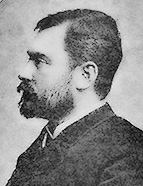

Due to its breadth and the diversity of subjects it sought to cover—Peninsular history, national and overseas history, Roman history, anthropology, religious myths, demography, economic and financial themes, etc—the collection represented an unprecedented project within the cultural milieu of Portugal’s Regeneration. Its aim was to disseminate a range of knowledge to a broader audience. This editorial endeavour reflected Oliveira Martins’s autodidacticism, his boundless scientific curiosity, and his evident interdisciplinary and global perspective, which distanced him from Herculano’s analytical rigour and liberal argumentation. Indeed, this autodidacticism was inseparable from Martins’s own biographical and professional path and his inclination for action.
Due to the death of his father, Martins did not complete secondary school and began working professionally at a young age, employed in two commercial firms (1858–70). He later served as the administrator of a mine in Andalusia (Santa Eufémia, 1870–74) (Fernandez Clemente, “J. P. d’Oliveira Martins nas minas…” [J. P. d’Oliveira Martins in the Mines…], 2008). At that time, he was described as follows: " On his face, drawn with broad, honest strokes, where his brow had the clarity and serenity of morning light, his green eyes sparkled, tear-coloured, vague and mysterious. Never was there a man whose smile was both so sorrowful and so luminous " ( Frederico D. d’ Ayalla, Os ideais de Oliveira Martins [The Ideals of Oliveira Martins], p. 32). Having returned to Portugal, he directed the construction of the Porto–Póvoa–Famalicão railway line and served as the administrator of its railway company. In the meantime, he was also elected president of the Sociedade de Geografia Comercial do Porto [ Porto Society of Commercial Geography ] (1880) and later appointed director of the Museu Industrial e Comercial do Porto [ Industrial and Commercial Museum of Porto ] (1884). Additionally, he served as administrator of the Régie dos Tabacos [Tobacco Monopoly] (from 1888) and the Companhia de Moçambique [Mozambique Company] (1888–90) and was part of the executive committee of the Exposição Industrial Portuguesa [Portuguese Industrial Exhibition] (1888).
This work is financed by national funds through FCT - Foundation for Science and Technology, I.P, in the scope of the projects UIDB/04311/2020 and UIDP/04311/2020.
